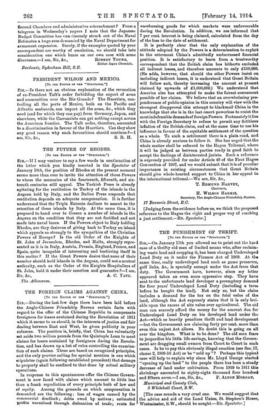THE PUNISHMENT OF THRIFT.
[To Tea Bonus 07 Tali .SracraTox., Sin,—On January 17th you allowed me to point out the bard case of a thrifty old man of limited means who, after reclaim- ing waste land and cropping it, has been charged Undeveloped Land Duty on it under the Finance Act of 1909. At the same time, really undeveloped land such as game preserves, golf links, Ac., is specially exempt under the Act from that duty. The Government have, however, since my letter appeared taken an even more oppressive step. They have sent to the unfortunate land developer a peremptory demand for four years' Undeveloped Land Duty (including a term before he bought the land). ' Not only so, but the claim includes a demand for the tax on the total value of the land, although the Act expressly states that it is only levi- able upon the excess of site value over agricultural. The old man can scarcely afford the money for the amount due for Undeveloped Land Duty on his developed land under the Act--which so heavily penalizes thrift and land development —but the Government are claiming forty per cent more than even this unjust Act allows. No doubt this is going on all over the kingdom. What is to be done? The old man fears to jeopardize his little life-savings, knowing that the Govern- ment are dragging small owners from Court to Court in such cases. Is he to pay this obviously illegal exaction (see See. 17, clause 2, 1909-10 Act) or be "sold up" P Perhaps this typical case will help to explain why since Mr. Lloyd George started "opening up the land" to the people there has been a steady decrease of land under cultivation. From 1909 to 1911 this shrinkage amounted to eighty-eight thousand four hundred
and fifteen acres.—I am, Sir, &c., F. ALTON MORGAN. Municipal and County Club,
2 Whitehall Court, S.W.
[The ease sounds a very cruel one. We would suggest that the advice and aid of the Land Union, St. Stephen's Hoare, Westminster, S.W., should be sought —ED. Spectator.]






































 Previous page
Previous page